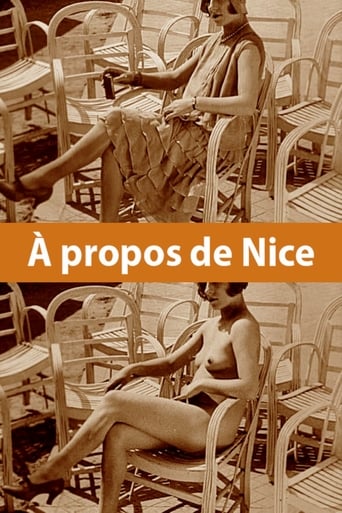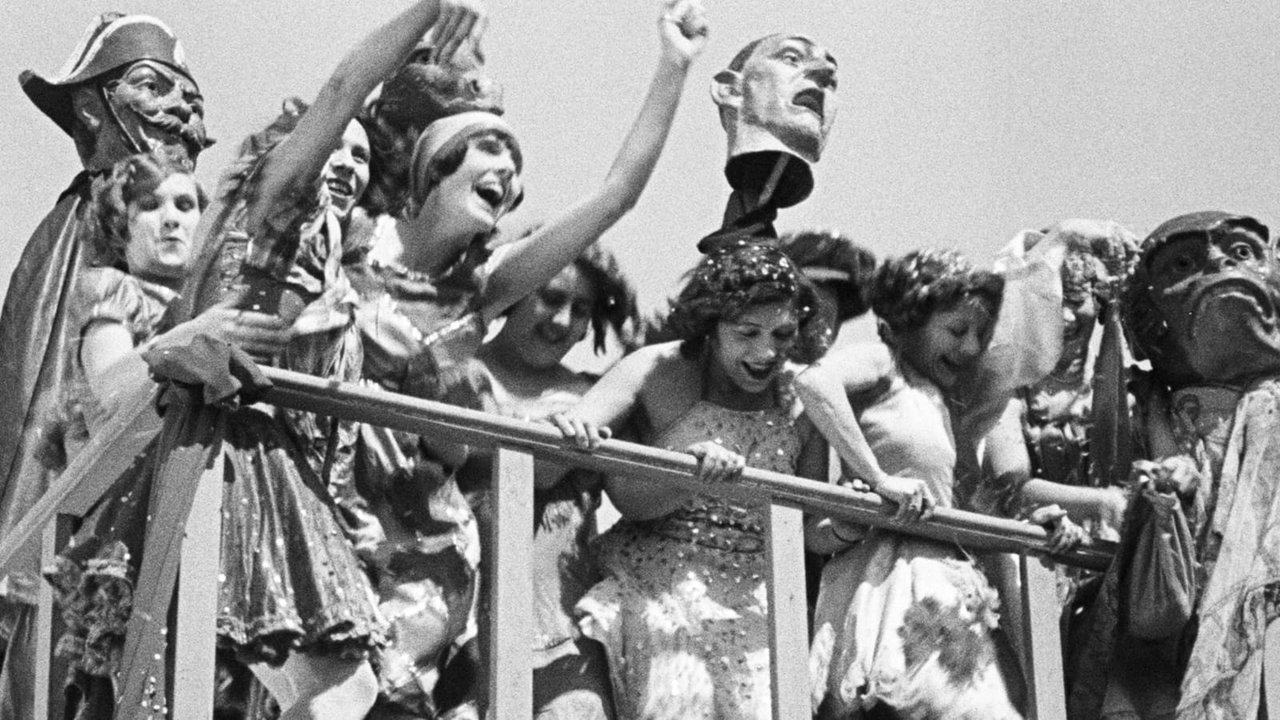framptonhollis
"A Propos de Nice" is a very fascinating work by the great, avant garde filmmaker Jean Vigo (who sadly died at the young age of 29, with an only four film long career). It's done with tons of style and creativity, and is quite reminiscent of the work of Dziga Vertov (most famous for directing the classic film "Man with a Movie Camera")), so, if you enjoyed any of Vertov's films, you may find this short to be quite interesting.Unlike your average Vertov film, "A Propos de nice" is surprisingly funny and satirical. If there's one thing we've learned from Vigo's small body of work is that he had a great sense of humor, and it's clearly evident in this film as well as both "Zero for Conduct" and "L'Atalante", and it's pretty impressive that Jean Vigo was able to make such a sharp satire without any dialogue or plot.But, satirical elements aside, it is a truly fun and wonderful visual experience. So, even if you have no interest into looking into the film's hidden satirical meaning, it's still a very well shot and interesting avant garde work.
kurosawakira
Miraculously enough we have these films not only on DVD but on Blu-ray, courtesy of the Criterion Collection. Considering that we'll never know what Vigo would have done after "L'Atalante" (1934), it's somehow gratifying that also his smaller works such as this and "Taris, roi de l'eau" (1931) receive such meticulous attention, because by no means are his two first films, despite the canonical status of both "Zéro de conduite" (1933) and "L'Atalante", worthless efforts and merely valuable in retrospect.An independent film in the true sense of the word (financed with the dowry Vigo received), there's something cosmically exuberant in the whole thing. It reminds me quite a lot of Welles' first film, "The Hearts of Age" (1934). Both films, by accident, might be shrugged off as first baby steps of a soon-blossoming genius, but they're both fine projections of cinematic ambition and energy. This film's raw form gives it an edge of aggression, and it swerves from moments of enormous zest to quiet reflection.On the Criterion there's a very good audio commentary by Michael Temple. He sees in the film a typical French essayist approach in terms of structuralization, consisting of an introduction (a general introduction to theme/location with aerial shots of Nice), thesis (shots of bourgeois, rich people walking around) and antithesis (the poor), leading up to a synthesis (the carnival). This does justice to Vigo's ideas of social cinema, I think, and is helpful in understanding the film's rhythm. Also nice are Temple's notions on the visual gags, which there are aplenty. This underlines what I love about cinema and Vigo: it's a visual medium, and to enable film to be film is to allow the thinking and hence exposition to be visual.One is left wondering what Vigo would've done had he lived longer. But that which we have, we cherish.
Graham Greene
Other reviewers have already commented on Vigo's subversive deconstruction of the various narrative requirements and visual iconography of the travelogue format for the purposes of cutting satire, to the point at which we almost forget to view the film on such a level; instead taking it entirely at face value. A Propos de Nice (1930) is a short work, though only twenty minutes shorter than Zéro de conduit (1933), which is an obvious minor masterpiece. Whereas that particular film - as well as the director's final feature, the even greater L'Atlante (1934) - presented captivating images and fragmented ideas backed by traces of character and narrative, the film in question is a purely visual experience. To understand the film we must read deeply into the subtle juxtaposition of the images as they are presented to us, in order to greater appreciate the ideas that Vigo is trying to convey.As with his second short film, Taris, roi de l'eau (1931), which looked at the daily routine of a synchronised swimmer, A Propos de Nice takes a conventionally bland presentational format and style and transforms it into a pure cinematic event. It is still, in all respects, a small-scale work; one that may confound and disappoint audiences looking for more of the magical realism and pretty evocation of youth and beauty presented by both Zéro de conduit and L'Atlante, though it is worth experiencing purely for Vigo's radical presentation and satirical evaluation of class and the bourgeoisie.
Arne Reisegg Myklestad
After scraping together enough money for a camera, it is said that the young film-fanatic Vigo set of portraying the 1920's city of Nice through inexperienced experimentationalism in a curious and clumsy way almost to the point of voyeuristic naivety. But then again, one might argue that such a viewpoint is more naïve than any you might encounter in the film. Through the inventive cinematography of Boris Kaufman, A propose de Nice describes life in the costal city with a subtle overtone of social criticism. As Jean Vigo reluctantly settled in Nice due to bad health, his discontent for bourgeois tourism is emphasised through its juxtaposition with the local working-class. The wealthy visitors lie annoyed and dissatisfied, roasting in the sun, while the local working class wait on them hand and foot with a smile and a cheerful attitude towards life. As they can be seen as death and the decay of man, the festival Mardi Gras dancers might represent the opposite through the life-giving consequence of female sexuality. More important, I believe the film displays a fairly accurate experience of Nice as that of the director through this delicate fusion of realism and surrealism.


 AD
AD

